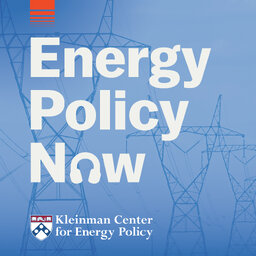
Energy Policy Now
Energy Policy Now offers clear talk on the policy issues that define our relationship to energy and its impact on society and the environment. The series is produced by the Kleinman Center for Energy Policy at the University of Pennsylvania and hosted by energy journalist Andy Stone. Join Andy in conversation with leaders from industry, government, and academia as they shed light on today's pressi…Social links:
Follow the podcast:

When Oil Sanctions Meet Dark Shipping
Oil sanctions have given rise to dark shipping, reshaping global energy flows and producing far-reaching economic consequences. --- In recent years, oil export sanctions have become a central tool of U.S. foreign policy, targeting major producers including Russia, Iran, and, until very recently V…
1:01:34
How PJM Is Grappling With Data Center Power Demand
The nation’s largest electric grid operator outlines its plan to manage rapid growth in data center electricity demand. --- PJM Interconnection, the nation’s largest grid operator, is preparing to file a wide-ranging proposal with federal regulators aimed at managing the rapid growth of electrici…
1:04:02
Planning the Grid in an Age of Uncertain Demand Growth
AI data centers are driving rapid demand growth, exposing the limits of traditional electricity forecasting and planning. --- Electricity demand in the United States is rising fast, fueled in large part by the rapid expansion of AI data centers. Grid operators have repeatedly revised their demand…
40:38
Why a New Gas Power Boom Is Putting Methane Emissions Back in the Spotlight
Gas-fired power is back in favor in the United States, but methane emissions threaten its credibility. --- Methane is one of the most potent greenhouse gases, and global efforts to curb methane emissions are accelerating. Beginning later this decade, the European Union will impose new methane ru…
51:12
When the Last Mile Turns Hot: Delivery Drivers in a Warming Climate
An economic sociologist discusses the growing heat dangers facing last-mile delivery drivers, and why federal protections remain stalled. --- E-commerce has transformed the way goods move through the American economy, driving unprecedented growth in parcel deliveries and intensifying competition …
46:42
The Cost of Pulling Back from China in the EV Transition
John Helveston of George Washington University discusses why a U.S. pullback from China on EVs is risky, and why engagement could strengthen America’s auto industry. --- China has rapidly become the center of global EV innovation, producing cars that are cheaper, faster to develop, and increasing…
55:41
How the Trump Administration Is Reshaping Nuclear Oversight
The Trump administration’s nuclear ambitions raise new questions about safety, speed, and regulatory independence. --- The Trump administration has made nuclear power a centerpiece of its energy agenda, launching the most aggressive federal push for new reactors in decades. Through sweeping execu…
44:51
U.S. Offshore Wind at an Impasse
What the U.S. offshore wind power crisis says about energy megaprojects, risk, and political resilience. --- After a surge of optimism, the U.S. offshore wind industry faces its most serious challenges yet. Just a year ago, the sector seemed poised for rapid growth, with East Coast states making …
47:23
Why Energy Inequities Could Persist in the Clean Energy Transition
A live discussion with Sanya Carley and David Konisky, authors of the new book Power Lines, on the inequities that define America’s energy system—and how they could carry into the clean energy future if left unacknowledged. --- In this special live episode of Energy Policy Now, recorded before an…
50:49
Union Leaders Push Clean Energy Jobs Agenda in Pennsylvania
With federal funding being pulled back, leaders of Pennsylvania’s top labor unions push state policy to deliver clean energy jobs. --- For generations, union members have mined Pennsylvania’s coal, run its power plants, and built its energy infrastructure, helping make the state a top fossil fuel…
1:12:29
 Energy Policy Now
Energy Policy Now